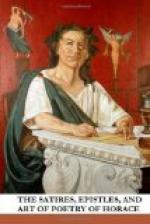In plays like these I would not deal alone
In words and phrases trite and too well known,
Nor, stooping from the tragic height, drop down
To the low level of buffoon and clown,
As though pert Davus, or the saucy jade
Who sacks the gold and jeers the gull she made,
Were like Silenus, who, though quaint and odd,
Is yet the guide and tutor of a god.
A hackneyed subject I would take and treat
So deftly, all should hope to do the feat,
Then, having strained and struggled, should concede
To do the feat were difficult indeed.
So much may order and arrangement do
To make the cheap seem choice, the threadbare new.
Your rustic Fauns, methinks, should have a care
Lest people deem them bred in city air;
Should shun the cant of exquisites, and shun
Coarse ribaldry no less and blackguard fun.
For those who have a father or a horse
Or an estate will take offence of course,
Nor think they’re bound in duty to admire
What gratifies the vetch-and-chestnut-buyer
The Iambic foot is briefly thus defined:
Two syllables, a short with long behind:
Repeat it six times o’er, so quick its beat,
’Tis trimeter, three measures for six feet:
At first it ran straight on; but, years ago,
Its hearers begged that it would move more slow;
On which it took, with a good-natured air,
Stout spondees in, its native rights to share,
Yet so that none should ask it to resign
The sixth, fourth, second places in the line.
But search through Attius’ trimeters, or those
Which Ennius took such pleasure to compose,
You’ll rarely find it: on the boards they
groan,
Laden with spondees, like a cart with stone,
And brand our tragedy with want of skill
Or want of labour, call it which you will.
What then? false rhythm few judges can detect,
And Roman bards of course are all correct.
What shall a poet do? make rules his sport,
And dash through thick and thin, through long and
short?
Or pick his steps, endeavour to walk clean,
And fancy every mud-stain will be seen?
What good were that, if though I mind my ways
And shun all blame, I do not merit praise?
My friends, make Greece your model when you write,
And turn her volumes over day and night.
“But Plautus pleased our sires, the good old
folks;
They praised his numbers, and they praised his jokes.”
They did: ’twas mighty tolerant in them
To praise where wisdom would perhaps condemn;
That is, if you and I and our compeers
Can trust our tastes, our fingers, and our ears,
Know polished wit from horse-play, and can tell
What verses do, and what do not, run well.




